|
|
|
Sort Order |
|
|
|
Items / Page
|
|
|
|
|
|
|
| Srl | Item |
| 1 |
ID:
147244
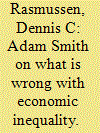

|
|
|
|
|
| Summary/Abstract |
This article explores Adam Smith's attitude toward economic inequality, as distinct from the problem of poverty, and argues that he regarded it as a double-edged sword. On the one hand, as has often been recognized, Smith saw a high degree of economic inequality as an inevitable result of a flourishing commercial society, and he considered a certain amount of such inequality to be positively useful as a means of encouraging productivity and bolstering political stability. On the other hand, it has seldom been noticed that Smith also expressed deep worries about some of the other effects of extreme economic inequality—worries that are, moreover, interestingly different from those that dominate contemporary discourse. In Smith's view, extreme economic inequality leads people to sympathize more fully and readily with the rich than the poor, and this distortion in our sympathies in turn undermines both morality and happiness.
|
|
|
|
|
|
|
|
|
|
|
|
|
|
|
|
| 2 |
ID:
147236


|
|
|
|
|
| Summary/Abstract |
This article examines a neglected topic, the imposition of counterrevolution. Whereas revolution can sweep across whole regions like a tsunami, reaction tends to advance gradually, country by country. As these differences suggest, counterrevolution unfolds in a more deliberate and systematic fashion than revolution, which is fueled by the rash, ill-considered belief that the tsunami's trigger—the striking overthrow of a longstanding ruler by mass protest—is widely replicable. While reactionaries share this facile inference during the revolutionary upsurge, they engage in learning thereafter, rely less on problematic inferences, and resume more rational decision-making. Longstanding experience and practices of open debate and collective deliberation enable them to process information more thoroughly and calibrate their counterrevolutionary plans to domestic opportunities. Consequently, they succeed in reestablishing autocratic control step by step. By demonstrating how reactionaries recuperated their grasp of political reality during the upheavals of 1848, the article elucidates the differential patterns of rationality in politics.
|
|
|
|
|
|
|
|
|
|
|
|
|
|
|
|
| 3 |
ID:
147240
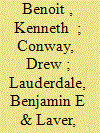

|
|
|
|
|
| Summary/Abstract |
Empirical social science often relies on data that are not observed in the field, but are transformed into quantitative variables by expert researchers who analyze and interpret qualitative raw sources. While generally considered the most valid way to produce data, this expert-driven process is inherently difficult to replicate or to assess on grounds of reliability. Using crowd-sourcing to distribute text for reading and interpretation by massive numbers of nonexperts, we generate results comparable to those using experts to read and interpret the same texts, but do so far more quickly and flexibly. Crucially, the data we collect can be reproduced and extended transparently, making crowd-sourced datasets intrinsically reproducible. This focuses researchers’ attention on the fundamental scientific objective of specifying reliable and replicable methods for collecting the data needed, rather than on the content of any particular dataset. We also show that our approach works straightforwardly with different types of political text, written in different languages. While findings reported here concern text analysis, they have far-reaching implications for expert-generated data in the social sciences.
|
|
|
|
|
|
|
|
|
|
|
|
|
|
|
|
| 4 |
ID:
147237


|
|
|
|
|
| Summary/Abstract |
Particularly in developing countries, there is a gap between written law and behavior. Comparative research emphasizes that laws go unenforced due to resource constraints or inadequate control of the bureaucracy. I instead introduce the concept of forbearance, or the intentional and revocable nonenforcement of law, and argue that politicians often withhold sanctions to maximize votes as well as rents. Drawing on tools from price theory and distributive politics, I present several methods to separate situations when politicians are unable versus unwilling to enforce the law. I demonstrate the identification strategies with original data on the enforcement of laws against street vending and squatting in urban Latin America. In contexts of inadequate social policy, politicians use forbearance to mobilize voters and signal their distributive commitments. These illustrations thus suggest the rich, and largely neglected, distributive politics behind apparent institutional weakness.
|
|
|
|
|
|
|
|
|
|
|
|
|
|
|
|
| 5 |
ID:
147245


|
|
|
|
|
| Summary/Abstract |
Do citizens respond to policy-based information signals about government performance? Using multiple big datasets—which link for the first time large-scale school administrative records and individual validated voting behavior—I show that citizens react to exogenous school failure signals provided by No Child Left Behind. These signals cause a noticeable increase in turnout in local school board elections and increase the competitiveness of these races. Additionally, I present evidence that school failure signals cause citizens to vote with their feet by exiting failing schools, suggesting that exit plays an underexplored role in democratic accountability. However, performance signals elicit a response unequally, with failure primarily mobilizing high propensity citizens and encouraging exit among those who are white, affluent, and more likely to vote. Hence, while performance signals spur a response, they do so only for a select few, leaving many others behind.
|
|
|
|
|
|
|
|
|
|
|
|
|
|
|
|
| 6 |
ID:
147247
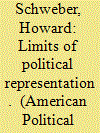

|
|
|
|
|
| Summary/Abstract |
A representation is always a selective and limited reproduction of the thing represented, an idea captured in the metaphor of a map. What is left out of a representation is as important as what is included. A specifically political conception of representation implies limits to the scope of that conception, the nature and character of the represented constituency, and the relationship between constituent and representative, irrespective of variations in institutional design and practice. The limits of political representation reflect normative commitments; consequently, a focus on those limits is central to an evaluation of representative practices. While it is important to look beyond familiar institutional forms, excessively inclusive descriptions of “representative,” “constituency,” or “representation” deprive those conceptions of their substantive content. The limits of political representation are not defects to be overcome by an ever-expanding definition of representation, they are an essential focus in the normative or empirical analysis of representative institutions and practices.
|
|
|
|
|
|
|
|
|
|
|
|
|
|
|
|
| 7 |
ID:
147238
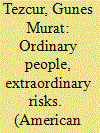

|
|
|
|
|
| Summary/Abstract |
Why do ordinary people take extraordinary risks and join an ethnic armed rebellion? This article tests a series of well-established hypotheses about selfish and identity based motivations and a new hypothesis based on prospect theory. It then employs a unique multimethod research strategy combining one of the most comprehensive datasets on insurgent recruitment that contains biographical information about 8,266 Kurdish militants with extensive fieldwork involving in-depth interviews with relatives of the militants to test these hypotheses. The findings show the decision to rebel is as much political as economic and social. While security concerns and expectations of benefits affect the decision to rebel, social commitments, identities radicalized by state repression, and collective threat perceptions among efficacious individuals generated by political mobilization, rather than preexisting ethnic cleavages, also lead to participation in an ethnic insurgency. The latter findings explain the durability of insurgencies with limited economic resources and their ability to attract educated fighters.
|
|
|
|
|
|
|
|
|
|
|
|
|
|
|
|
| 8 |
ID:
147241
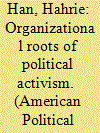

|
|
|
|
|
| Summary/Abstract |
This article examines the role that democratic organizations play in fostering political activism in America. Activists make democracy work by attending meetings, engaging others, trying to make their voice heard, and participating in myriad other ways. Yet, we still need a deeper understanding of what role organizations play in cultivating that activism. The article presents data from three field experiments showing that creating a relational organizational context makes targets more likely to sign petitions, recruit others, and attend meetings. The article argues that civic organizations can have a powerful impact on activism. In doing so, it introduces a new set of variables related to organizational context to consider in understanding the sources of participation. The article thus extends a burgeoning body of experimental research on the social bases of voter turnout by examining not only voting but other forms of activism that are increasingly common modes of citizen involvement in the twenty-first century.
|
|
|
|
|
|
|
|
|
|
|
|
|
|
|
|
| 9 |
ID:
147248
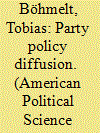

|
|
|
|
|
| Summary/Abstract |
Do parties learn from or emulate parties in other political systems? This research develops the argument that parties are more likely to employ the heuristic of learning from and emulating foreign successful (incumbent) parties. Spatial-econometric analyses of parties’ election policies from several established democracies robustly confirm that political parties respond to left-right policy positions of foreign political parties that have recently governed. By showing that parties respond to these foreign incumbent parties, this work has significant implications for our understanding of party competition. Furthermore, we contribute to the literature on public policy diffusion, as we suggest that political parties are important vehicles through which public policies diffuse.
|
|
|
|
|
|
|
|
|
|
|
|
|
|
|
|
| 10 |
ID:
147239
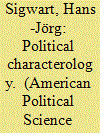

|
|
|
|
|
| Summary/Abstract |
Notwithstanding its status as a modern classic, Hannah Arendt's study on The Origins of Totalitarianism is generally considered to be lacking a clearly reflected methodological basis. This article challenges this view and argues that in her study Arendt implicitly applies a characterological method of political theorizing that provides a genuine conceptual framework for systematically connecting structural analysis with ideographic historical investigations and with a political theory of action. On this conceptual basis, the study renders an analysis of anti-Semitism, imperialism, and totalitarianism not merely in terms of abstract structural concepts, but in terms of dynamic character-context constellations. Arendt's account not only shows interesting parallels to a number of similar conceptual reflections, especially in the 20th century's theory debate; it can also serve to inspire the current debate on methodology in political theory.
|
|
|
|
|
|
|
|
|
|
|
|
|
|
|
|
| 11 |
ID:
147243


|
|
|
|
|
| Summary/Abstract |
Research on presidential power focuses almost exclusively on the modern era, while earlier presidents are said to have held office while congressional dominance was at its peak. In this article, I argue that nineteenth-century presidents wielded greater influence than commonly recognized due to their position as head of the executive branch. Using an original dataset on the county-level distribution of U.S. post offices from 1876 to 1896, I find consistent evidence that counties represented by a president’s copartisans in the U.S. House received substantially more post offices than other counties, and that these advantages were especially large under divided government and in electorally important states. These results are robust across model specifications and when examining the Senate. The findings challenge key components of the congressional dominance and modern presidency theses, and have important implications for scholarship on interbranch relations, bureaucratic politics, and American political development.
|
|
|
|
|
|
|
|
|
|
|
|
|
|
|
|
| 12 |
ID:
147242


|
|
|
|
|
| Summary/Abstract |
This article explores the relationship between non-electoral representatives and democratic legitimacy by combining the recent constructivist turn in political representation with systemic work in deliberative theory. Two core arguments are advanced. First, non-electoral representatives should be judged by their position in a wider democratic system. Second, deliberative democracy offers a productive toolkit by which to evaluate these agents. I develop a framework of systemic representation which depicts the elemental parts of a democratic system and assigns normative standards according to the space occupied. The framework gives priority of democratic analysis to the systemic level. This helps mitigate a central concern in the constructivist turn which suggests that representatives mobilize constituencies in ways that are susceptible to framing and manipulation. I engage in case-study analysis of the collapsed Anti-Counterfeiting Trade Agreement to unpack the different spaces occupied by non-electoral representative and elucidate the varied democratic demands that hinge on this positioning.
|
|
|
|
|
|
|
|
|
|
|
|
|
|
|
|
| 13 |
ID:
147246
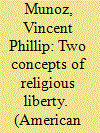

|
|
|
|
|
| Summary/Abstract |
Due in part to the influence of Michael McConnell, free exercise exemptionism is generally thought to be compatible with, if not dictated by, the founders’ church-state political philosophy. This article rejects that position, arguing instead that America's constitutional tradition offers two distinct conceptions of religious liberty: the founders’ natural rights free exercise and modern moral autonomy exemptionism. The article aims to distinguish these two approaches by clarifying how they are grounded upon divergent philosophical understandings of human freedom and by explaining how they advance different views of what religious liberty is, how it is threatened, and, accordingly, how it is best protected. The article also attempts to demonstrate how our modern approach expands the protection for religious liberty in some ways but limits it in others.
|
|
|
|
|
|
|
|
|
|
|
|
|
|
|
|
|
|
|
|
|